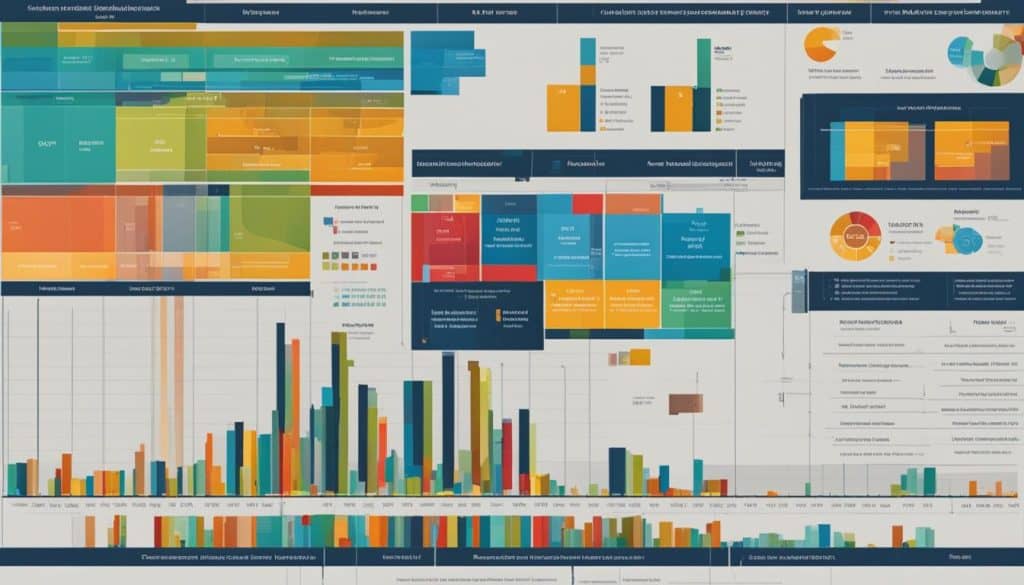Are you looking for ways to optimize your finances within the US healthcare system while also maximizing your benefits? Consider exploring a health insurance giveback program.
With a health insurance giveback program, you can potentially save money on healthcare expenses and enhance your coverage. These programs provide reimbursements, refunds, or rebates to policyholders, allowing you to offset the costs of premiums, copayments, deductibles, and other healthcare-related expenses.
Understanding how these programs work and how to choose the right one for your needs can be daunting, but with the help of an independent Medicare agent, like Integrity Now Insurance Brokers, you can navigate the complexities of health insurance policies and find the best options for you.
Key Takeaways:
- A health insurance giveback program can help you save money on healthcare expenses.
- These programs provide reimbursements, refunds, or rebates to policyholders.
- Choosing the right program can be overwhelming, but independent Medicare agents can help guide you through the process.
- Maximizing the benefits of your health insurance giveback program requires staying informed and updated on the latest developments and changes.
- Exploring a health insurance giveback program can help optimize your benefits and finances within the US healthcare system.
Understanding Health Insurance Giveback Programs
Health insurance giveback programs are designed to help policyholders save money on their medical expenses. These programs provide refunds, cash back, or rebates to policyholders, helping them maximize their benefits and optimize their finances. By participating in a giveback program, you can potentially save hundreds or even thousands of dollars per year.
How Health Insurance Refunds Work
Health insurance refunds are a type of giveback program that provides policyholders with money back from their insurance provider. Refunds can be issued for a variety of reasons, such as overpayments, unused benefits, or unmet deductibles. In some cases, refunds may be issued automatically, while in others, policyholders may need to request a refund.
Getting Cash Back from Your Health Insurance
Health insurance cash back programs offer policyholders the opportunity to receive cash back for certain health-related expenses. For example, some cash back programs may provide reimbursements for gym memberships, wellness programs, or other health-related services. To participate in a cash back program, policyholders typically need to meet specific criteria, such as attending a certain number of fitness classes or reaching a certain health goal.
Understanding Health Insurance Rebates
Health insurance rebates are another type of giveback program that can help policyholders save money on their healthcare expenses. Rebates are typically issued by insurance providers at the end of the year and are based on the overall cost of healthcare services used by policyholders. Rebates can vary in amount and are often based on factors such as age, gender, and overall health status.

“Enrolling in a health insurance savings program can provide numerous benefits for you and your family.”
Overall, a health insurance savings program can be an excellent way to optimize your finances and enhance your coverage. By exploring your options and choosing a program that aligns with your needs and goals, you can access the care you need while staying within your budget.
Achieving Health Insurance Money Back
If you’re looking to achieve health insurance money back, a health insurance giveback program may be the solution you’re seeking. These programs offer policyholders the opportunity to receive refunds, reimbursements, or cash back on their healthcare expenses. To qualify for these benefits, you need to meet certain eligibility requirements and take specific steps.
Eligibility Criteria
The eligibility criteria for health insurance giveback programs vary based on the program and your insurance provider. In general, you need to have a policy that meets specific requirements, such as being up-to-date on premium payments and having a certain level of coverage. Typically, these programs are available to individual and group policyholders.
The Process
The process for achieving health insurance money back through a giveback program typically involves submitting a claim for reimbursement or receiving automatic cash back. You might need to provide documentation of your medical expenses, such as receipts, invoices, or billing statements, to support your claim.
Once your claim has been approved, you’ll receive your refund or reimbursement in the form of a check, direct deposit, or statement credit. Note that the amount of money you receive may not necessarily cover the full cost of your medical expenses.
Maximizing Your Benefits
To maximize your benefits and achieve the most health insurance money back possible, it’s vital to understand the terms and conditions of your health insurance giveback program and know how to navigate the reimbursement process. Work with an independent Medicare agent like Integrity Now Insurance Brokers, who can guide you through the complexities of your insurance policy and help you take advantage of all the benefits available to you.
Additionally, keeping careful records of your healthcare expenses and submitting claims promptly can help ensure that you receive the maximum benefits from your program.

Exploring Health Insurance Reimbursement
If you are seeking a way to reduce the costs associated with healthcare, health insurance reimbursement may be an option worth considering. Health insurance reimbursement programs allow you to receive payments from your insurance provider for medical expenses that you have already paid for out of pocket.
In most cases, health insurance reimbursement is available for expenses that fall outside of your policy’s coverage. For instance, if your plan doesn’t cover chiropractic care, but you’ve already paid for it, you may be eligible for reimbursement.
The Types of Health Insurance Reimbursement
There are different types of health insurance reimbursement available, depending on your insurance provider and policy. Some of the most common reimbursement options include:
- Flexible spending accounts (FSA): An FSA is a type of savings account that allows you to set aside pre-tax dollars to pay for out-of-pocket healthcare expenses. You can then submit receipts for reimbursement from your FSA account.
- Health reimbursement arrangements (HRA): An HRA is an employer-funded account that reimburses you for eligible medical expenses.
- Health savings accounts (HSA): An HSA is a type of savings account that allows you to set aside pre-tax dollars to pay for qualified medical expenses. Unlike an FSA, the funds in an HSA account are not subject to a use-it-or-lose-it policy. Instead, the money rolls over from year to year and can be invested.
It’s important to note that not all health insurance plans offer reimbursement programs. Therefore, it’s essential to check with your insurance provider to find out what options are available to you.
Submitting a Health Insurance Reimbursement Claim
If you’re eligible for reimbursement, the next step is to submit a claim to your insurance provider. In most cases, you’ll need to provide proof of payment for the medical expense you’re requesting reimbursement for.
| What You’ll Need to Submit a Reimbursement Claim | Examples |
|---|---|
| Proof of Payment | Receipts, bank statement showing debit card payment, canceled check |
| Explanation of Benefits | A document showing what your insurance provider paid and what you owe |
| Claim Form | A form provided by your insurance provider to request reimbursement |
| Other Documentation | Doctor’s note, medical records, referral form |
Once your insurance provider reviews and approves your claim, you’ll generally receive a check or direct deposit for the eligible amount.
Conclusion
Health insurance reimbursement can be a valuable tool in managing healthcare costs, especially for expenses that fall outside of your policy’s coverage. By understanding the types of reimbursement available and the steps to take to submit a claim, you can make the most of your health insurance benefits.

Unlocking Health Insurance Rewards Programs
Health insurance rewards programs offer policyholders additional benefits beyond their regular coverage. These perks can include wellness incentives, gym memberships, and discounts on healthcare services. By participating in a health insurance rewards program, you can not only save money but also lead a healthier lifestyle.
Most rewards programs offer a variety of incentives that cater to different interests and needs. For instance, some programs may offer rewards for completing a wellness checkup or participating in a smoking cessation program. Others may provide discounts on gym memberships or fitness classes.
To make the most of a rewards program, it’s important to understand the types of incentives offered and how to qualify for them. Some programs may require you to meet certain health goals or participate in specific programs to earn rewards. Others may offer rewards automatically as you use your insurance benefits.
Sample Table: Comparing Health Insurance Rewards Programs
The following table provides a brief comparison of some popular health insurance rewards programs.
| Rewards Program | Incentives Offered | Eligibility Requirements |
|---|---|---|
| Aetna | Gym membership discounts, smoking cessation programs | Completion of wellness checkup, participation in smoking cessation program |
| UnitedHealthcare | Fitness tracker rewards, virtual coaching | Enrollment in eligible plans, use of fitness tracker |
| Cigna | Fitness class discounts, health coaching | Completion of health assessment, participation in health coaching |
As you can see, rewards programs can differ in the types of incentives offered and the eligibility requirements for earning them. By comparing different programs, you can choose one that aligns with your interests and goals.
Overall, health insurance rewards programs can provide valuable benefits for policyholders. By taking advantage of these incentives, you can enhance your coverage and lead a healthier lifestyle.

Enhancing Your Coverage with a Health Insurance Benefits Reimbursement
If you are looking to enhance your healthcare coverage and offset the costs of medical expenses, a health insurance benefits reimbursement program can provide significant benefits. This type of program allows you to receive reimbursements for various healthcare expenses, making it easier to manage your healthcare costs and optimize your benefits.
Typically, health insurance benefits reimbursement programs cover essential healthcare services, such as preventive care, prescription medications, and medical procedures. By enrolling in one of these programs, you can save money on your healthcare expenses and ensure that you have the coverage you need to stay healthy and protected.
How Health Insurance Benefits Reimbursement Works
A health insurance benefits reimbursement program works by reimbursing you for certain healthcare expenses that are not covered by your insurance plan. This could include copayments, deductibles, or other out-of-pocket costs that you incur while receiving healthcare services.
To receive the reimbursement, you will need to submit a claim form to your insurance provider along with the relevant receipts or invoices. Once your claim is processed and approved, you will receive a check or direct deposit for the eligible amount.
The Benefits of Health Insurance Benefits Reimbursement
Enrolling in a health insurance benefits reimbursement program provides several benefits, including:
- Cost savings: By receiving reimbursements for healthcare expenses, you can save money and manage your healthcare costs more effectively. This can help you avoid financial strain and ensure that you have the funds you need to stay healthy.
- Enhanced coverage: By offsetting costs and providing additional benefits, a reimbursement program can enhance your healthcare coverage and ensure that you have access to the services you need to maintain your health.
- Flexibility: Health insurance benefits reimbursement programs typically offer flexibility in terms of the types of healthcare expenses that are eligible for reimbursement. This means that you can tailor the program to your specific needs and preferences.

Overall, a health insurance benefits reimbursement program can be an excellent way to enhance your healthcare coverage and optimize your benefits. By exploring the options available and selecting a program that aligns with your needs and goals, you can tap into the potential savings and benefits of this type of program.
Choosing the Right Health Insurance Giveback Program
When it comes to selecting a health insurance giveback program, it’s essential to evaluate your options carefully. Here are some factors to consider:
- Coverage: Ensure that the program provides adequate coverage for your healthcare needs and requirements.
- Cost: Compare the premiums, copayments, and deductibles of different programs to determine which one is the most cost-effective option for you.
- Eligibility: Check the qualifying criteria to determine if you are eligible to participate in the program.
- Reimbursement: Explore the reimbursement policies and procedures to understand how to receive the refunds, cash back, or rebates.
- Rewards: Look for additional rewards or incentives offered by the program, such as wellness programs, gym memberships, or other benefits that can enhance your healthcare experience.
By evaluating these factors, you can make a more informed decision about which health insurance giveback program aligns with your specific needs and goals. Keep in mind that choosing the right program can provide you with numerous benefits, including enhanced coverage, potential savings, and greater financial stability when it comes to healthcare costs.
Example Table: Comparing Health Insurance Giveback Programs
| Program | Coverage | Cost | Eligibility | Reimbursement | Rewards |
|---|---|---|---|---|---|
| Program A | Covers basic healthcare needs | Low premiums, high deductible | Employed individuals only | Pays 50% of eligible expenses | Free gym membership |
| Program B | Comprehensive coverage for medical and dental | High premiums, low deductible | Individuals and families | Provides cash back for unused benefits | Wellness incentives |
| Program C | Covers pre-existing conditions | Mid-range premiums, low deductible | Individuals under 65 with chronic conditions | Reimburses eligible expenses up to a set amount | Discounts on healthcare services |
Comparing and contrasting the features of different health insurance giveback programs can help you select the best one for your unique needs. Remember to consider your budget, healthcare requirements, and personal preferences when making your final decision.
Once you’ve chosen your program, be sure to stay up-to-date on any changes or updates that may impact your coverage or reimbursements. With the right program and an informed approach, you can maximize your benefits and optimize your finances for a healthier, happier future.

Exploring the Role of Independent Medicare Agents
Understanding health insurance giveback programs can be overwhelming, especially for those who are new to the US healthcare system. That’s where independent Medicare agents come in. These agents are experts in their field and can provide valuable guidance and support in choosing the right health insurance giveback program for your needs.
At Integrity Now Insurance Brokers, our independent Medicare agents work closely with you to understand your unique situation and help you navigate the complexities of health insurance giveback programs. They can provide you with detailed information about how these programs work, what benefits they offer, and how to enroll.
One of the main advantages of working with an independent Medicare agent is that they are not tied to any specific insurance company. This means they can offer unbiased advice and help you choose from a variety of options based on your individual needs and preferences.
Our agents can also provide ongoing support and assistance, helping you file claims, resolve billing issues, and make the most of your benefits. They can answer any questions you have along the way and keep you informed about any changes or updates to your policy.
Why Choose an Independent Medicare Agent?
When it comes to choosing a health insurance giveback program, working with an independent Medicare agent can offer many benefits, such as:
- Access to a wider range of insurance options
- Unbiased advice and guidance
- Expert knowledge of the healthcare industry
- Assistance with claims and billing issues
- Ongoing support and assistance
Overall, working with an independent Medicare agent can help ensure you make the most of your health insurance giveback program, saving you money and giving you peace of mind.

Our agents at Integrity Now Insurance Brokers are dedicated to helping you find the right health insurance giveback program for your specific needs. Contact us today to learn more about how we can help you navigate the complex world of healthcare insurance and maximize your benefits.
Making the Most of Your Health Insurance Giveback Program
Now that you understand the benefits of a health insurance giveback program, it’s time to make the most of it. Here are some tips on how to leverage this program and optimize your healthcare coverage:
- Check with your insurance provider to confirm your eligibility for a health insurance giveback program which can offer benefits such as health insurance refunds, cash back, or rebates.
- Enroll in a health insurance savings program to save money on premiums, copayments, deductibles, and other healthcare-related expenses.
- Find out how to achieve money back from your health insurance provider through a giveback program and the steps you need to take to receive reimbursements or refunds.
- Explore the different types of reimbursement policies available and how they can benefit you.
- Discover the potential rewards and incentives offered by health insurance rewards programs, such as gym memberships, wellness incentives, or discounts on healthcare services.
- Learn how a health insurance benefits reimbursement program can help offset the costs of preventive care, prescription medications, and other essential healthcare services.
- Consider the factors that are important to you when choosing a health insurance giveback program that aligns with your specific coverage needs and financial goals.
By following these tips and leveraging the benefits of a health insurance giveback program, you can optimize your healthcare coverage and save money on healthcare-related expenses. Remember to stay informed and updated on any changes to the program and how they may affect you.

Conclusion
Exploring a health insurance giveback program can help you maximize your benefits and optimize your finances within the US healthcare system. By enrolling in such a program, you can potentially save money and enhance your coverage by receiving refunds, cash back, or rebates from your insurance provider.
Choosing the right program requires careful consideration of your coverage needs and financial goals. You may also want to work with an independent Medicare agent, like Integrity Now Insurance Brokers, to navigate the complexities of different policies and find the best options for your needs.
To make the most of your health insurance giveback program, you can leverage reimbursements to offset the costs of healthcare services, prescription medications, and preventive care. Staying informed and updated on the latest developments and changes in these programs can help you continue to enjoy the benefits and savings they offer.
Overall, a health insurance giveback program can be an excellent way to enhance your coverage and save money on your healthcare expenses. Take the time to explore your options and choose a program that aligns with your needs and goals.
FAQ
What is a health insurance giveback program?
A health insurance giveback program is a program that provides refunds, cash back, or rebates to policyholders, allowing them to save money on their healthcare expenses.
How does a health insurance giveback program work?
Health insurance giveback programs work by allocating a portion of the premiums collected from policyholders towards potential reimbursements or refunds. The amount returned to policyholders is typically based on factors such as claims experience, utilization, and the overall financial performance of the insurance provider.
What are the benefits of a health insurance savings program?
Enrolling in a health insurance savings program can help you save money on premiums, copayments, deductibles, and other healthcare-related costs. It can provide financial relief by reducing your out-of-pocket expenses and maximizing your coverage.
How can I achieve money back from my health insurance?
To achieve money back from your health insurance, you can participate in a giveback program offered by your insurance provider. You will need to meet the eligibility criteria and follow the necessary steps to receive reimbursements or refunds.
What is health insurance reimbursement?
Health insurance reimbursement refers to the process of getting reimbursed for medical expenses. When you incur a covered expense, your insurance provider reviews the claim and reimburses you for the eligible portion of the cost.
What are health insurance rewards programs?
Health insurance rewards programs offer additional perks and incentives to policyholders. These programs may include benefits such as gym memberships, wellness incentives, or discounts on healthcare services, encouraging individuals to maintain a healthy lifestyle.
How can a health insurance benefits reimbursement enhance my coverage?
A health insurance benefits reimbursement program can help offset the costs of preventive care, prescription medications, and other essential healthcare services. By providing additional financial support, it allows individuals to access the care they need without excessive financial burden.
What factors should I consider when choosing a health insurance giveback program?
When choosing a health insurance giveback program, consider factors such as the eligibility requirements, types of reimbursements available, the financial stability of the insurance provider, and how the program aligns with your specific coverage needs and financial goals.
What role do independent Medicare agents play in health insurance giveback programs?
Independent Medicare agents, such as Integrity Now Insurance Brokers, play a crucial role in guiding individuals through health insurance giveback programs. These agents help navigate the complexities of insurance policies, provide personalized advice, and assist in finding the best options for your needs.
How can I make the most of my health insurance giveback program?
To maximize the benefits of your health insurance giveback program, leverage refunds, cash back, rebates, and other reimbursements to optimize your healthcare coverage. Understand the program’s rules and requirements, stay informed about eligible expenses, and take advantage of available incentives and rewards.
How can I stay informed and updated on health insurance giveback programs?
Stay informed and updated on health insurance giveback programs by keeping track of new rules, regulations, and opportunities that may arise. Stay connected with your insurance provider, consult with independent Medicare agents, and regularly research and review the latest developments in the industry.










